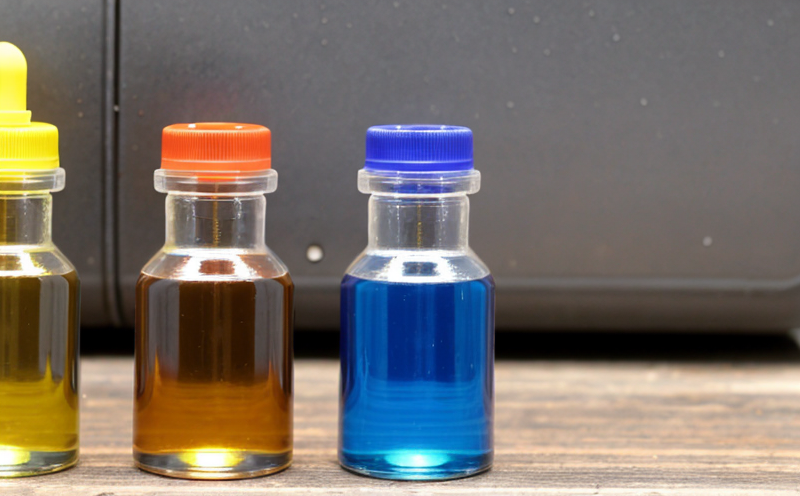Biofuel Acid Value Testing
The biofuel acid value is a critical parameter that quantifies the amount of free fatty acids present in biodiesel or other types of biofuels. This measurement is essential for ensuring fuel quality, optimizing production processes, and maintaining compliance with international standards such as ASTM D6751.
Biodiesel produced from vegetable oils or animal fats contains naturally occurring free fatty acids (FFAs). The presence of FFAs can influence the performance characteristics of biofuels in engines. High FFA levels may lead to increased wear on engine components, reduced fuel efficiency, and even fuel system blockage. Therefore, precise measurement of acid value is crucial for quality assurance.
Acid value testing involves neutralizing the free fatty acids present in a sample using a standard solution (usually potassium hydroxide). The amount of titrant required to reach the equivalence point indicates the acid content of the fuel. This method adheres strictly to ASTM D6751-23, which specifies procedures for determining the free fatty acid content of biodiesel.
Sample preparation is a key step in biofuel acid value testing. Samples must be representative and uncontaminated. Typically, samples are filtered through 0.45 micrometer filters to remove particulates that could interfere with the titration process. The filtered sample is then carefully measured into a conical flask for titration.
The titration itself involves adding standardized potassium hydroxide solution to the sample while swirling the flask continuously until the endpoint is reached. Endpoint detection can be done using phenolphthalein as an indicator, which changes color from colorless to pink when the equivalence point is achieved. The volume of titrant used to reach this point is recorded and converted into acid value units (mg KOH/g).
Once the test results are obtained, they are reported according to ASTM D6751 guidelines. Reporting includes details such as sample identification, method used, temperature conditions during testing, and the calculated free fatty acid content.
In quality management, biofuel acid value testing plays a vital role in ensuring product consistency and reliability. By monitoring FFA levels, manufacturers can adjust production processes to maintain fuel quality. For compliance officers, this test is essential for meeting regulatory requirements related to biodiesel quality. R&D engineers can use the results of these tests to optimize formulations and enhance biofuel performance.
For procurement teams, knowing the acid value helps in selecting suppliers who adhere to high-quality standards. This ensures that only compliant batches are purchased, reducing risks associated with non-compliant fuels.
Eurolab Advantages
- Expertise and Experience: Eurolab boasts a team of highly skilled chemists and analysts specializing in biofuel testing. Our personnel are trained to handle complex samples and interpret results accurately.
- Advanced Equipment: We utilize state-of-the-art titrators capable of precise measurements, ensuring accurate acid value determinations.
- Comprehensive Reporting: Eurolab provides detailed reports that not only include the calculated acid value but also offer insights into potential issues and recommendations for improvement.
- Fast Turnaround Times: Our streamlined processes allow for rapid testing, ensuring timely results for our clients' needs.
- Compliance with Standards: Eurolab strictly adheres to international standards such as ASTM D6751 and other relevant regulations, guaranteeing accurate and reliable test outcomes.
Eurolab’s commitment to excellence in biofuel acid value testing sets us apart from competitors. Our rigorous quality control measures ensure that every test result is precise and trustworthy.
Customer Impact and Satisfaction
By partnering with Eurolab for biofuel acid value testing, our customers benefit significantly in terms of fuel quality assurance and regulatory compliance. The accurate data provided by Eurolab helps companies make informed decisions regarding production processes and procurement strategies.
One of the primary impacts is enhanced product reliability. With precise acid value measurements, manufacturers can ensure that their biofuels meet or exceed industry standards, thereby improving customer satisfaction and brand reputation.
Moreover, compliance with regulatory requirements is simplified through Eurolab’s testing services. This reduces the risk of non-compliance penalties and ensures a smooth regulatory journey for our clients.
In terms of customer satisfaction, Eurolab consistently delivers accurate results within agreed-upon timelines. Our transparent communication and comprehensive reporting further enhance client confidence in our services.
Many of our customers have reported increased trust in their supply chain as a result of Eurolab’s rigorous testing protocols. This has led to stronger relationships with suppliers and improved overall business performance.
Competitive Advantage and Market Impact
- Precision: Our advanced instrumentation provides unparalleled precision, setting us apart in the market.
- Speed: Faster turnaround times allow our clients to make decisions more swiftly.
- Compliance: Strict adherence to international standards ensures that all tests are accurate and reliable.
- Expertise: Our team of experts brings extensive knowledge and experience, enhancing the quality of testing.
- Trust: Eurolab’s reputation for delivering precise and timely results fosters trust among clients.
Eurolab’s biofuel acid value testing service contributes significantly to our clients’ competitive edge. By ensuring high-quality biofuels, we help our customers maintain a strong market presence and meet regulatory demands effectively.
The market impact of Eurolab’s services extends beyond individual clients. By setting industry standards through precise and reliable testing, we contribute to the overall quality and safety of biofuels in the market.





